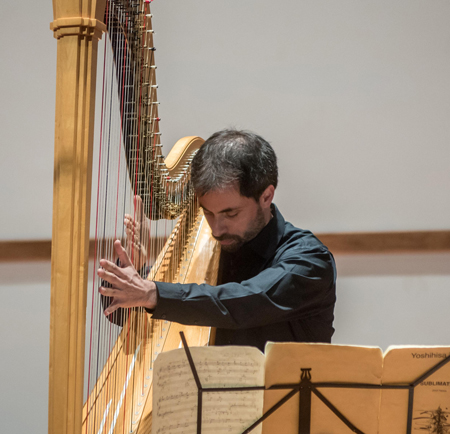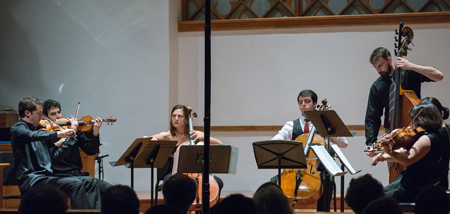by Neil McCalmont

Japanese-born French composer Yoshihisa Taïra’s Sublimation for solo harp presents a challenge for the soloist — to command as wide a diversity of sound as possible out of the instrument — but harpist Sivan Magen reveled in its difficulty. He brought out ghoulish shrieks and hair-raising cackles from the harp in the beginning, flowing on to more pondering and eerily calm sections. When the music went quiet, the high-register plucks over the bass drone brought to mind orbiting in black, lifeless outer-space. It was a thrilling and fitting prelude to the rest of the concert.
The centerpiece of the program was “A Musical Dialogue Across the Centuries on The Seven Last Words of Christ” compiled by Damir Janigro. Four of Joseph Haydn’s Seven Last Words of Our Savior on the Cross for string quartet, Op. 51 were interspersed with three of Sofia Gubaidulina’s Sieben Worte (“Seven Words”) for cello and bayan (accordion).
The sound of the quartet — Itamar Zorman and Noah Bendix-Balgley, violins, Dimitri Murrath, viola, and Timotheos Petrin, cello — thrived in the acoustics of the church. Petrin’s descending lines elicited a visceral reaction, especially in combination with Bendix-Balgley’s and Murrath’s yearning, pulsing notes. Zorman’s high-register vibrato truly sounded like a man sighing on the cross.
In Haydn’s harmonic web in the penultimate movement, the musicians effortlessly passed themes back and forth with remarkable clarity. The final movement, marked Terremoto (“Earthquake”), lived up to its name. The relentless and vociferous hashing and slashing of notes seemed to make the church tremble, but the ensemble never lost its pristine intonation.
The duo of accordionist Merima Kljuco and cellist Julie Albers gave a nuanced and captivating reading of Sieben Worte. The two seemed to breathe together throughout “Father, forgive them…” Their delicately calculated dynamics brought out how much emotion Gubaidulina packs into her music. Kljuco’s playing, especially when quiet, was simply haunting. “I am Thirsty” came off as dystopian, filled with slides that bordered on the disturbing. As the music edged into higher and higher pitches, you might have thought a demon was playing a theremin. Albers produced a deep, luscious tone during “It’s Over,” which flowed directly into Haydn’s earthquake.
After intermission, Bendix-Balgley, Zorman, Albers, and Petrin joined Yura Lee and Teng Li, violas, along with Nathan Farrington, bass, for Richard Strauss’ Metamorphosen, originally for twenty-three solo strings, arranged here for seven. The piece was written after the devastation caused by World War II, which had a profoundly depressing effect on the composer. It was one of his last compositions, finished when he was in his eighties.
This performance was the most moving of the evening, probably of the entire festival so far. The ensemble brought the 25-minute string requiem to incomprehensible heights. It would be truly unfair to the performers to attempt to capture the transcendence of their performance in words. After speaking with other members of the audience who agreed how special this was and how speechless it made them, all this listener can say is that it made him feel completely dead on the inside — in the best way possible.
Photos by Gary Adams.
Published on ClevelandClassical.com June 29, 2016.
Click here for a printable copy of this article



